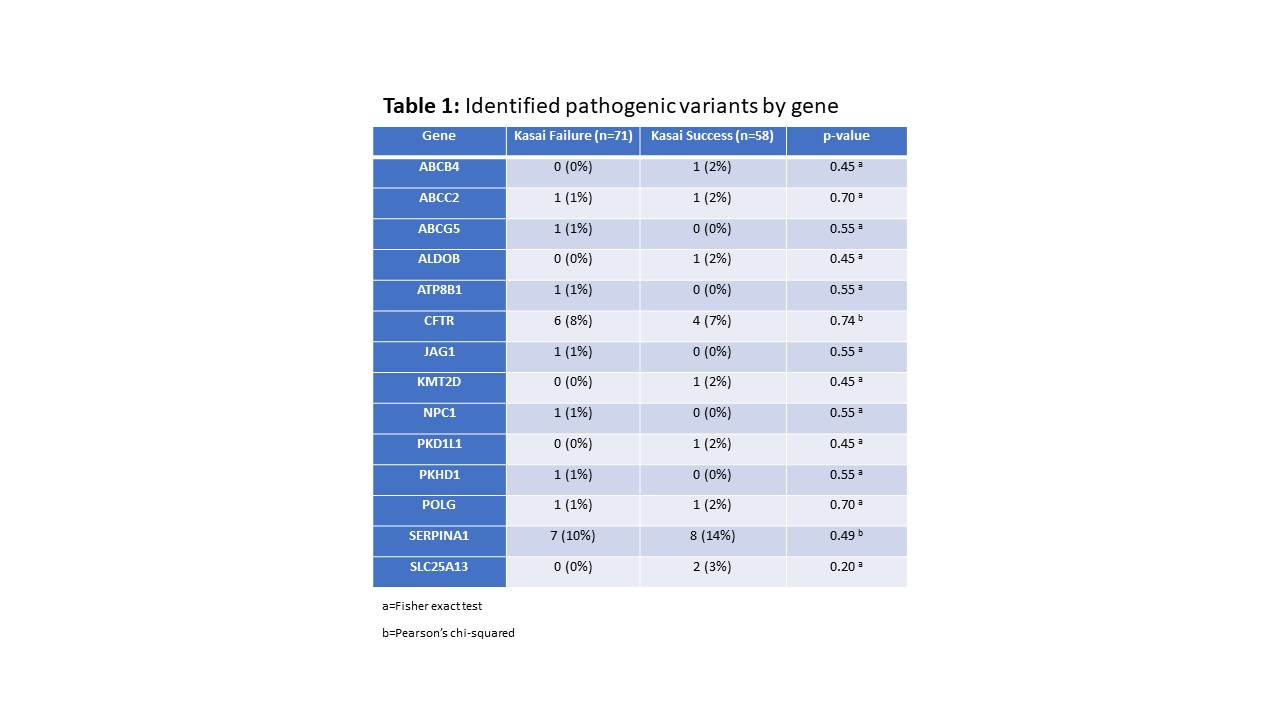Aaron Bennett, United States has been granted the Non-abstract Travel Grant for SPLIT Multi-D Members to Attend the SPLIT 2025 Annual Meeting
Influence of genetic variation in cholestasis genes on biliary atresia outcomes
Aaron Bennett1, Bryanna Domenick1, Phoebe Wood1, Deborah Watson2, Jasmine Purcell2, Margaret Harr2, Elizabeth Rand1, Alanna Strong2.
1Gastroenterology, Hepatology, and Nutrition, Children's Hospital of Philadelphia, Philadelphia, PA, United States; 2Human Genetics, Children's Hospital of Philadelphia, Philadelphia, PA, United States
Introduction: Biliary atresia (BA) is the most common cause of obstructive cholestasis in neonates. The primary treatment for BA is surgical palliation via Kasai Portoenterostomy (KPE). Despite KPE, nearly half of patients with BA require a liver transplant (LT) by two years of age, and overall lifetime risk of LT is high. Efforts have been made to identify factors that prognosticate the need for and timing of LT in this population. We performed a retrospective study of individuals with BA & KPE with the goal of identifying genetic predictors of outcome.
Method: Individuals with BA were dichotomized into KPE failure (KF; LT listing prior to age 2 years) and success (KS; LT listing after age 2 years), representing persistent cholestasis post-KPE and non-cholestatic complications, respectively. Genetic evaluation of 77 genes associated with Mendelian cholestatic disorders was performed on liver tissue and blood specimens, previously saved in IRB approved biorepositories. The incidence of pathogenic genetic variants was compared between groups.
Results: 129 individuals were included (KF=71, KS=58). 489 variants were identified in 67 genes, including 40 variants classified as pathogenic/likely pathogenic present in 14 genes. Thirty-six individuals harbored one or more pathogenic/likely pathogenic variant. There was no significant difference in the frequency of pathogenic/likely pathogenic variants between groups (Table 1).
Conclusion: Our study did not identify a genetic risk predictor for KPE outcomes. Additional higher-powered studies are warranted; however, based on our study, families should not be counseled that variants in Mendelian cholestasis genes predict worse KPE outcomes.

The authors gratefully acknowledge funding provided by: The Auger family in memory of Benjamin Auger, The Fred & Suzanne Biesecker Liver Center, and the K08 Mentored Career Development Award K08DK128606 (A.S.). Authors have no other disclosures. .
The WebApp is sponsored by:

If you have any questions during the meeting, please go to the registration desk. Our emails will be monitored sporadically.
REGISTRATION DESK OPENING TIMES
Thursday, May 1, 2025, 07:00-17:30 Friday, May 2, 2025, 07:00-12:00